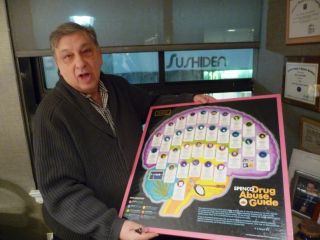Freudian Psychology
Clutter vs. Hoarding vs. Collecting
Some thoughts on managing our passions for objects.
Posted September 24, 2015 Reviewed by Jessica Schrader

Earlier this month, I spoke at the national conference of Institute for Challenging Chronic Disorganization.
I was delighted to discover that ICD members deal not only with clutterbugs and disorganized folk, but also with full-blown hoarders. Many professional organizers don’t, because people with “clutter issues” and people who hoard are fundamentally different. Essentially, clutterbugs can be persuaded to let things go; for hoarders, it’s a terrible terrible struggle, and dealing with them requires psychological insight and tremendous, informed patience.
In my talk, I mentioned something characteristically admiring of hoarders that Randy Frost, the father of hoarding psychology, emphasized when I interviewed him—that hoarders possess a heightened sensitivity and imagination about objects that most of us are don’t. They are, in this way, like artists. While this is true, hoarders lack one capacity essential to an artist who makes art—the capacity to cut. To edit. To “kill your babies,” as David Mamet puts it. As the noted New York comic psychologist, Woody Allen, once specified the best advice for improving any piece of comic writing, sight unseen: “Make it shorter.”
I was reminded at the conference of an interview I’d done for my memoir Mess with another New Yorker, Dr. Barry Lubetkin. Lubetkin had owned a grandfather clock—more accurately, the clock’s decoratively adorned main panel—from the Collyer brothers’ hoarded Harlem mansion. His father, an antiques dealer, had bought the whole clock at auction in 1947.
I had to see it, and I hastened to Lubetkin’s office near Rockefeller Center—at the Institute of Behavioral Therapy, where Lubetkin, a prominent psychotherapist, it turned out, is director and co-founder. He possessed the wheezy air of the Borscht Belt about him. “MIND HEALER,” proclaimed an enormous metal sign on his office wall.
The Collyers’ clock face turned out, unfortunately, to be in storage. Not viewable. But my visit was still worth it. Because like Freud (sort of), Lubetkin is both a psychologist and a collector. “Psychollectibles” he calls his 200-some pop kitsch objects, artworks, and artist’s books—all related to psychology. “MIND HEALER” once hung over a psychic’s tent in 1940s Coney Island. Chuckling, he showed me his special artist edition of Freud’s Interpretation of Dreams, containing all of Freud’s text—printed randomly: Freud as literal gibberish!
And then he said, “I’d go to these antique shows as a young man, and there’d be millions of items, all fascinating. And the only way I could handle it, I decided, would be to develop a specialty. Otherwise I’d be engulfed.”
The remark resonated—focusing on a specific narrow theme as a kind of protection against inundation by the myriad enticements of the object-world.

Had he seen an increase in hoarding problems in recent years, I wondered?
Not so much, he told me, as an increase in people overwhelmed by clutter.
“Hoarders can’t let go,” he declared, “but clutterers can.”
I nodded in agreement. “But it’s hard,” I told him, speaking as a clutterbug in the midst of decluttering.
Then I brought out my iPad gallery of “before” pictures of my apartment for his assessment. “It’s improved greatly since this,” I assured him. But would he call the scale of my hodgepodge-collecting “hoarding”? Or more like clutter? “Absolutely,” he said, scanning. Then he chuckled. “But I’m looking at your stuff for my collection! To hell with your problem, whaddya got for me there, baby!”
Getting to Selective
At the conference in Cleveland, Judith Kolberg, the thoughtful, straight-talking founder of ICD, had a question for me: How would one help a hoarder to become more selective? A good question, and I wasn’t sure how to answer.
What first comes to mind is advice according to Randy Frost: You ask someone who hoards to try throwing something away as an experiment. Not as a broad policy, but as a small trial. Then you both monitor how it goes. And you build from there. Perhaps you’ll reach the state of Lee Shuer, the congenial ex-hoarder who collaborated with Frost on a CBT-based peer-group guide for hoarders and clutterbugs. “I’m not Mr. Dispose-o,” Shuer quipped when I interviewed him for Mess. “I’m Mr. Save-o!” He’d managed to reduce his accumulations of bobblehead dolls, flea-market savories, and musical instruments to a selection he was proud to show off to visitors—a hoarder transformed into something of a collector. (Collectors usually like to display their objects; hoarders usually don't).
Shuer was aided in his transformation by the essential encouragement of his wife and by joining a support group run by Frost. But this is selectivity in de-acquisitioning. Is it possible to be selective about acquiring objects? Shuer mentioned with a grin that he’d just stayed at a hotel that had “cool” matchbooks—and he’d actively resisted his old urge to grab one up as a memento, a small but empowering action. But I’m not sure how one arrives at what to focus on. Perhaps it’s accomplished by the same sort of experimenting that Frost advocated for letting go.
Whatever the process, for hoarders it will take time, patience, and courage.
Of course there’s always the issue of who wants the change—the hoarders themselves or someone else? Unless crisis looms—a landlord threatens or a loved one can’t take it anymore—who’s to say it isn’t all a matter of personal style?
And please understand: I don’t say this lightly.




